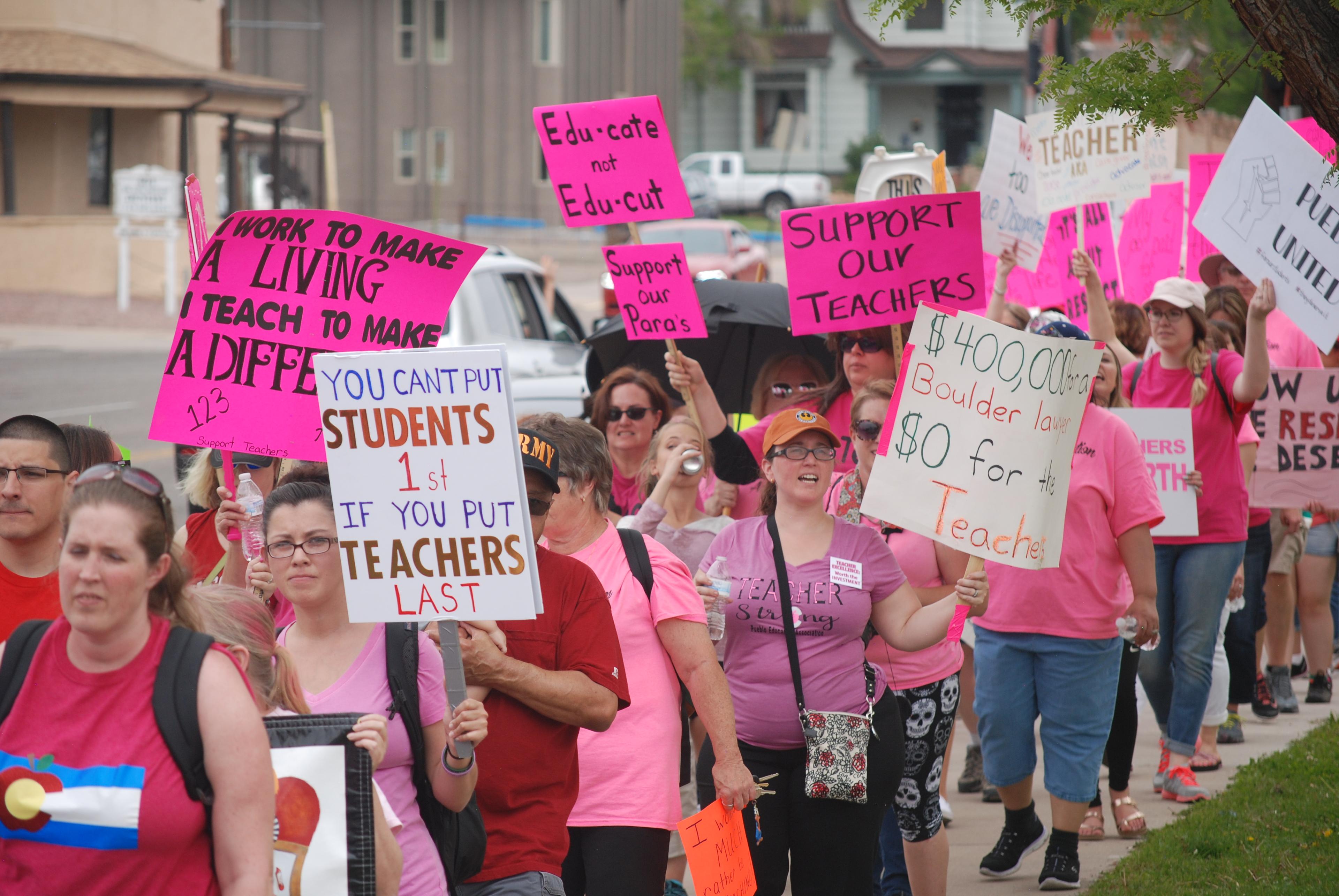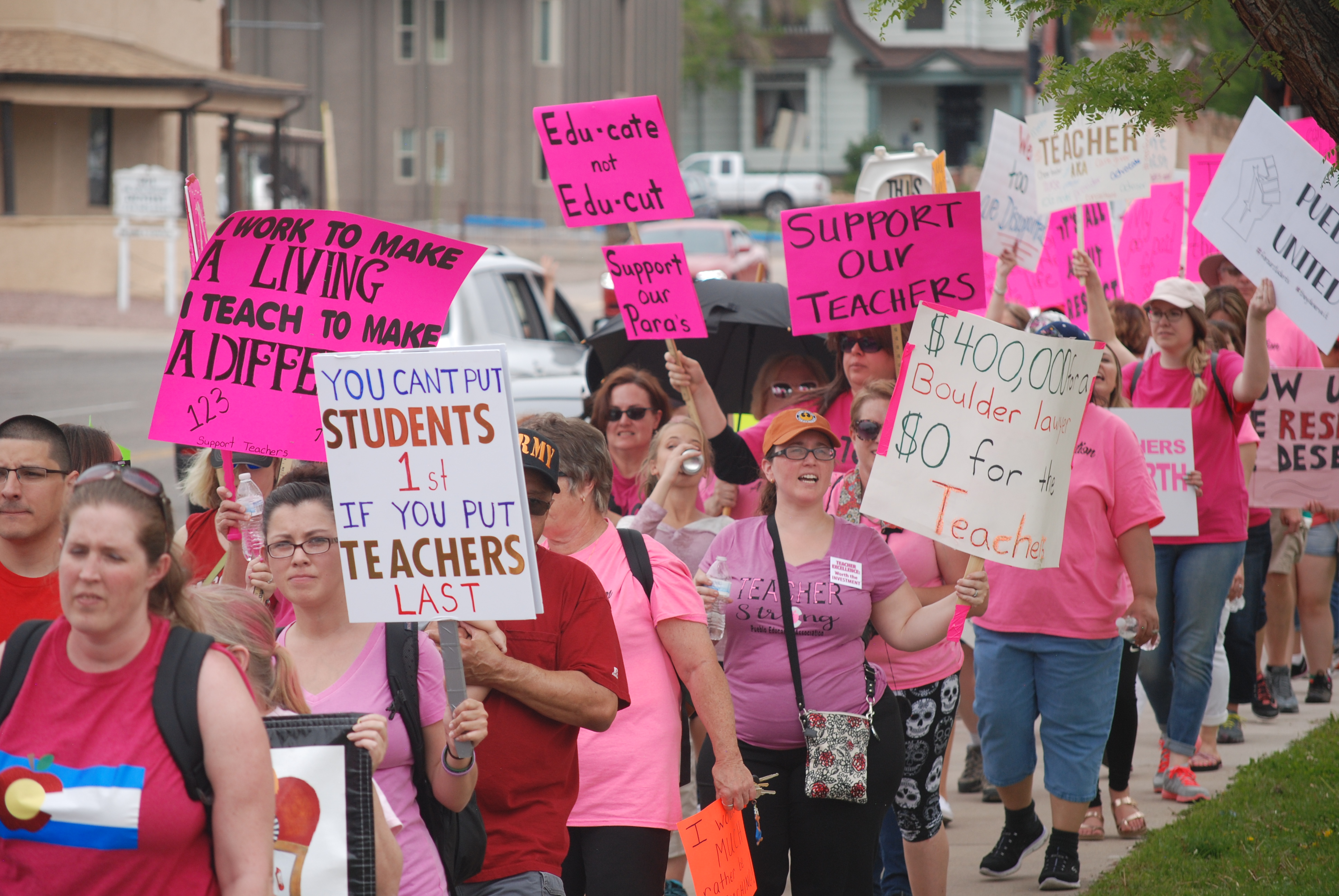

Published 8:41 a.m. | Updated 5:22 p.m.
Hundreds of teachers in Pueblo went on strike Monday, shutting down schools and leaving some 16,000 students without classes in a dispute over how much they should be paid for the school year that's nearly over.
The strike comes as frustrated teachers in several states have won pay increases.
Teachers in the historically pro-union community want a 2 percent cost of living raise for the current school year, which was recommended by a fact finder brought in to help reach an agreement. But the school district says it cannot afford another raise for the teachers until the state begins to pay it back next year for underfunding during the recession.
And the strike is underway. Day 1 of D60 walkout sees pink shirted picketers at area schools and on prominent thoroughfares like Fourth and Abriendo pic.twitter.com/aoMx4ZcREn
Qualified teachers, who have been working under an expired contract since August, received raises based on their experience and education levels.
High school math teacher Rochelle Maes was one of the chanting marchers, all dressed in pink. Like many of her colleagues, she said it’s not about the money.
"What’s going to make a huge difference in my life is to have a contract at the beginning of the year to have a district who supports me and recognizes me as a professional," Maes said.
Teachers turned down last-minute offers of one-time, 2-percent stipends for this year that would have deferred a 2.25 percent raise until next year. Unlike the stipends, the pay increases would become a part of teachers' base pay and the starting point for future increases.
Teachers won raises in the last two years after drawn out negotiations. They have said they are tired and distrustful of the school district's promises, union president Suzanne Ethredge said.
The district says it would be irresponsible for it to again dip into its reserves to fund teachers raises.
"They want to be respected, they want to budgeted for in advance. We feel that’s what this offer is doing. We feel like this is the best we can put forward and we are extremely hopeful we can reach resolution soon," district spokesman Dalton Sprouse said.
#PuebloD60Strike picketers surround the school district administration offices pic.twitter.com/WTxx6ut4d0
After several years of tense contract talks, Ethredge said she thinks teachers in Pueblo would have voted to strike even without encouragement from the national movement.
"This has been coming on for years. Our teachers have put up with not very good classroom conditions, being treated disrespectfully and having their voices ignored in decisions routinely and regularly — and they’re tired of it," Ethredge said.
With the two sides currently stalemated, it’s unclear when children might be getting back to class. Strike organizers are urging teachers to return to the picket lines tomorrow.
In the meantime, the school district is distributing free lunches to students who might otherwise miss meals. Other community organizations around Pueblo are also offering activities and day care for school-age children.
Parent Jessie Stolzenberger, who picked up sack lunches at the main library for her kids, supports the strike.
"We are with the teachers. It doesn’t matter that it's going to affect us in any way. What matters is that the teachers get what they deserve, because they work so hard for everybody," Stolzenberger said.
Despite a booming economy, Colorado ranked 40th in the U.S. for per pupil spending in 2012-13, according to the Colorado School Finance Project. That is largely because of the state's strict constitutional tax-and-spending limits.
While another constitutional amendment requires the state to increase spending on schools each year, state lawmakers who do not have the power to raise taxes without voter approval changed the way they calculated that increase during the recession to balance the Colorado's budget by providing less money for extras like at-risk student funding.
People are chanting “get up, get down, Pueblo is a union town.” pic.twitter.com/DeDsd2GxDO
That has particularly hurt less prosperous communities like Pueblo that have smaller tax bases to tap to supplement state funding as other districts have. Pueblo recently decided to join the over half of Colorado districts, most of them rural, that have switched to a four-day school week to save money.
A former teacher who now heads the Pueblo school board, Barb Clementi, wrote in a recent op-ed in the Pueblo Chieftain that people should focus on what she said is the root of the problem — state funding.
Clementi said the district expects to get another $7 million to $8 million from the state for the next school year while a proposed ballot measure to raise taxes on people earning over $150,000 could bring the district $30 million a year.
"With additional resources, together we can develop a plan that will offer more competitive salaries, attract and retain the best teachers, and ensure the high quality education that our students and community deserve," she said.
Teachers have the right to strike in Colorado after giving notice to the state.
Last week, the state labor department declined to intervene in the Pueblo dispute after neither side asked for it to exercise its full power to do so, although the school district did ask for the state's guidance.
Teacher strikes in Colorado have been rare in recent history. Denver teachers went on strike in 1994 and returned to work after Gov. Roy Romer intervened.
CPR Freelancer Shanna Lewis contributed to this report.








